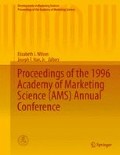Abstract
As gifts, greeting cards have no apparent economic or functional value. This study examines empirically greeting card usage and focuses on the role of greeting cards in building and sustaining relationships.
Access this chapter
Tax calculation will be finalised at checkout
Purchases are for personal use only
Preview
Unable to display preview. Download preview PDF.
References
Belk, R. W. 1979. "Gift-Giving Behavior." in Research in Marketing, Vol. 2, ed. Jagdish N. Sheth, Greenwich CT.JAI: 95–126.
—. 1988. "Possessions and the Extended Self." Journal of Consumer Research 15 (September): 139–168.
Bollen, K. A. 1989. Structural Equations with Latent Variables. New York: John Wiley & Sons.
Cacioppo, J. T. and B. L. Andersen. 1981. "Greeting Cards as Data on Social Processes." Basic and Applied Social Psychology 2.2 (June): 115–119.
Coleman, J. S. 1988. "Social Capital in the Creation of Human Capital." American Journal of Sociology 94 (supplement): 95–120.
Kunz, P. R. and M. Woolcott. 1976. "Seasons Greetings: From my Status to Yours." Social Sciences Research 5.3 (September): 269–278.
Papson, S. 1986. "From Symbolic Exchange to Bureaucratic Discourse: The Hall Mark Greeting Card." Theory: Culture and Society 3.2: 99–111.
Roach, L. 1994. "Greeting Card Explosion." Direct Marketing (July): 66–67.
Rucker, M., L. Leckliter, S. Kivel, M. Dinkel, T. Freitas, M. Wynes, and H. Prato. 1991. "When the Thought Counts: Friendship, Love, Gift Exchange and Gift Returns." in Advances in Consumer Research Vol 18: 528–531.
Wandycz, K. 1991. "Love Means Never Having to Say Anything." Forbes (April): 88–90.
Wolfinbarger, M. F. 1990. "Motivations and Symbolism in Gift-Giving Behavior." in Advances in Consumer Research, Vol 17, ed. Marvin Goldberg et. al. Provo. UT: 699–706.
Author information
Authors and Affiliations
Editor information
Editors and Affiliations
Rights and permissions
Copyright information
© 2015 The Academy of Marketing Science
About this paper
Cite this paper
Paswan, A.K., Subramanian, S. (2015). Communication of Feelings and Relationship: Greeting Card Buying Behavior. In: Wilson, E.J., Hair, J.F. (eds) Proceedings of the 1996 Academy of Marketing Science (AMS) Annual Conference. Developments in Marketing Science: Proceedings of the Academy of Marketing Science. Springer, Cham. https://doi.org/10.1007/978-3-319-13144-3_2
Download citation
DOI: https://doi.org/10.1007/978-3-319-13144-3_2
Published:
Publisher Name: Springer, Cham
Print ISBN: 978-3-319-13143-6
Online ISBN: 978-3-319-13144-3
eBook Packages: Business and EconomicsBusiness and Management (R0)

